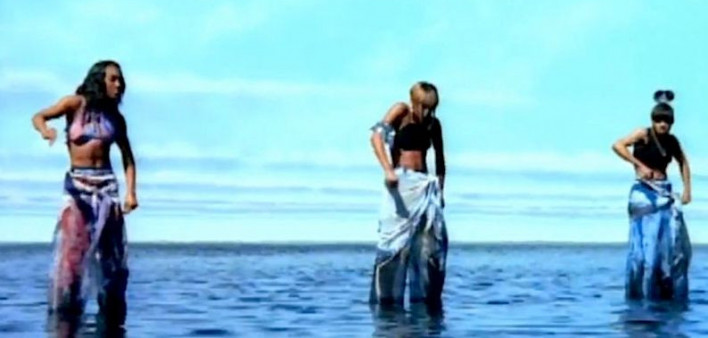If you listened to pop music in the mid-1990s—or any time since—then you know TLC’s massive hit “Waterfalls.” But if you’re like me, you had no idea until right now, in January 2020, that the chart-topper tackles the issue of HIV/AIDS.
I learned this musical factoid on the occasion of the upcoming Grammy Awards, held January 26. This year’s Grammy Week events included a panel discussion titled “STORIESTelling: Music and HIV/AIDS,” which you can read about on Grammy.com.
Participants included pop singer–turned–AIDS activist (and 2008 POZ cover girl) Sherri Lewis; director of talent and entertainment relations at ONE, Abby Sasser; Moscham CEO and former EMI music chairman Mark Poston; manager Rebecca Drucker; and performing artist and POZ ROZ actress Chauntae Pink, whom POZ readers just voted Best Actor or Actress in Film or Television for the 2019 POZ Awards. John Daley Kennedy, a producer and content creator, moderated the panel. The event was held in collaboration with Stories: The AIDS Monument, which is being built in West Hollywood, California.
According to the panelists, one of music’s biggest impacts on the epidemic, especially during the first two decades of AIDS, was its ability to raise the issue of HIV. As Poston said, “Music and artists help open the discussion and create the awareness.”
One of the examples included in the article was TLC’s 1995 smash “Waterfalls.” Say what? That song raised awareness about HIV? Incredulous, I googled the lyrics and meaning of the song.
Turns out, waterfalls refers to unhealthy, negative habits or actions. As in, “Don’t go chasing waterfalls / Please stick to the rivers and the lakes that you’re used to.” That much I do remember.
But if you listen to the verses, you’ll hear the trio sing and rap about two different stories, both tragedies involving people who chased waterfalls. One is a young Black man who, despite pleading by his mother, chooses street life and dies in a drug deal. The other is a sexy and hypersexual and apparently heterosexual (or maybe bi?) white dude who is apparently not monogamous or is perhaps a sex addict—it’s unclear to me, but his behavior definitely results in his death: “Three letters took him to his final resting place.”
Even if I would have picked up that last line back in the ’90s, I might not have guessed those three letters were HIV. But it’s more obvious to me now after rewatching the video—which you can check out at the top of this blog post. I now notice the prominent display of (unused) condoms in the scene corresponding to these lyrics. Remember, “Waterfalls” was released as a single in 1995, just one year before the advent of lifesaving HIV meds, a time when condoms and safe sex messages were synonymous with fear of AIDS.
Here are the HIV-related lyrics and a chorus:
Little precious has a natural obsession for temptation
But he just can’t see
She give him loving that his body can’t handle
But all he can say is, “Baby, it’s good to me”
One day he goes and takes a glimpse in the mirror
But he doesn’t recognize his own face
His health is fading and he doesn’t know why
Three letters took him to his final resting place
Y’all don’t hear me
Don’t go chasing waterfalls
Please stick to the rivers and the lakes that you’re used to
I know that you’re gonna have it your way or nothing at all
But I think you’re moving too fast
Hold on, though, let’s slow down for a moment, because I must raise a question. Not to hate on “Waterfalls,” but does art have the power to raise HIV awareness if it doesn’t clearly, if not explicitly, actually mention HIV or AIDS?
Then again, maybe everyone else on the planet knew “Waterfalls” referenced HIV and sex. It’s totally possible I overlooked it or simply forgot it all these years later.
Either way, “Waterfalls” remains an amazing track that holds up today, and I’ve been humming it all afternoon—and now, maybe you are too.
* * *
UPDATE: Wow! 20,000 Likes in 24 hours. What an unexpected pleasure that so many people are responding to this POZ blog post, which probably has something to do with the love of TLC. It’s been interesting to read the comments on social media and in my DMs—lots of people also expressed their surprise at learning “Waterfalls” tells an HIV story, yet seemingly more readers expressed their surprise at discovering my (alleged) stupidity.
In my defense, I realize now that in 1995 I had just moved to NYC after college and was poor AF and didn’t even have a TV; if I saw the full video, it was likely at a bar or party. And though I of course knew the song and its chorus, I admit I probably didn’t pay much attention to the details in the verse back in the day. Discovering the meaning in 2020 was a nice surprise I wanted to share.
One aspect of the online discussions I appreciate most is folks pointing out other songs that addressed HIV and spoke to them, such as Janet Jackson’s 1997 hit “Together Again,” which I did know was inspired by the loss of loved ones to the epidemic. Then again, I was pretty much a huge Janet fan since her days on TV’s Good Times and Fame—how many of you younguns remember that!?!
The awesome aspect about timeless music like “Waterfalls” and “Together Again” is that it transcends generations, genders, sexualities and socioeconomic classes. We can all learn and appreciate new aspects this music at different points in our lives. It’s endlessly inspiring.








12 Comments
12 Comments